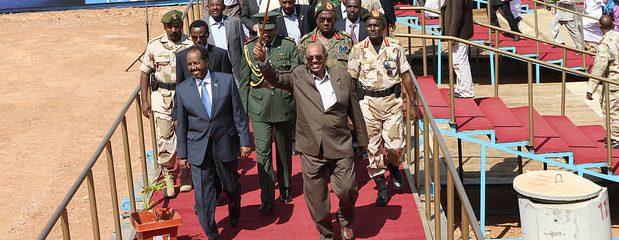Mamdani’s Darfur “Activism”
 A number of reviewers seem to be impressed by the research Mahmood Mamdani has done in producing his tendentious Saviors and Survivors. Perhaps if more were known about the history Mamdani purports to tell they would be less impressed. I’ll offer a single egregious example of error, but one so large in implication it should give serious pause to anyone tempted to regard Mamdani as a serious student of Darfur and Sudan. To maximize the chances that the implications of Mamdani’s error are taken seriously, I’ll borrow a passage from a recent posting on this site by Sean O’Fahey, perhaps the most distinguished historian of Darfur and Sudan alive today (and recent author of The Darfur Sultanate: A History, Columbia University Press, 2008):
A number of reviewers seem to be impressed by the research Mahmood Mamdani has done in producing his tendentious Saviors and Survivors. Perhaps if more were known about the history Mamdani purports to tell they would be less impressed. I’ll offer a single egregious example of error, but one so large in implication it should give serious pause to anyone tempted to regard Mamdani as a serious student of Darfur and Sudan. To maximize the chances that the implications of Mamdani’s error are taken seriously, I’ll borrow a passage from a recent posting on this site by Sean O’Fahey, perhaps the most distinguished historian of Darfur and Sudan alive today (and recent author of The Darfur Sultanate: A History, Columbia University Press, 2008):
“Concepts of superiority in Darfur were historically linked to Islam and not directly or solely to ethnic identity. The Fur, the largest ethnic group in Darfur, are clearly an amalgam of ethnicities that grew by
assimilation defined by Islam, but marked by the use of the Fur language (Fur was the court language until 1916) and allegiance to the Keira dynasty. In Saviors and Survivors, Professor Mamdani applies [Sudan historian Jay] Spaulding’s ideas about Arabisation/ Arabicisation under the Funj sultans along the Nile to Darfur. This is misleading; the ethno/political realities of the Funj state [in Eastern Sudan] and Darfur were quite different. Spaulding’s ideas of “enclaves” of Arabisation/Islamisation in the towns along the Nile, do not apply in Darfur if only because there were virtually no towns in the latter. Darfur is no way part of the Nilotic Sudan.” (“Ethnic Identity in
Darfur,” April 7, 2009.)
The simple truth is that Mamdani does not know Sudan or Darfur well, has cooked his political narrative in advance, and in his inaccurate and over-generalizing attack on American Darfur advocacy largely ignores the enormously and deliberately destructive actions of Khartoum in Darfur, even those of its central players: there is no mention in the book of Nafi’e Ali Nafi’e, the most powerful advisor to indicted President Omar al-Bashir and largely in charge of current overall Darfur policy; there is no mention whatsoever of Saleh Abdalla “˜Gosh,’ head of the rightly dreaded National Security and Intelligence Service, which has played such a central role in Darfur’s destruction; Vice President Ali Osman Taha is mentioned only twice and briefly, even as he took over the Darfur portfolio at the height of the violence in early 2004; there is no discussion of more than five years of systematic obstruction and harassment of humanitarian assistance to Darfur by the regime.
In the entire book there are only a half dozen references to the major human rights organizations that have consistently and authoritatively documented–in scores of reports–massive “ethnic cleansing” and crimes against humanity since 2003; and yet even these sparse references bear not on Darfur but other African crises. There is no mention at all of Physicians for Human Rights, which has made the most powerful case for a genocide determination, with comprehensive on-the-ground investigations (these are reflected in “Darfur–Assault on Survival: A Call for Security, Justice and Restitution.”) Nor does Mamdani anywhere discuss the substance of mortality data/reports he characterizes, including the investigation by the Coalition for International Justice along the Chad/Darfur border in August/September 2004, which generated the statistically critical document “Documenting Atrocities in Darfur”–the basis for the American determination that genocide was occurring in Darfur. This also has bearing on Mamdani’s frequently inaccurate and uncomprehending account of mortality in Darfur. “Documenting Atrocities in Darfur” is, I believe, the most important document extant bearing on violent mortality through summer 2004; its substance, methods, and purposes–and that of other reports–cannot simply be ignored, as Mamdani does.
Mamdani is a perverse mirror image of his homogenizing caricature of American Darfur advocacy. Such history of the region as he provides is totally derivative from previous scholarship (shaped to his political thesis), and his contact with the most significant elements of Darfuri civil society and the rebel groups seems minimal. His minimizing of the suffering and destruction endured by the people of the region is a disgrace to serious efforts to “make sense of Darfur.”






“The simple truth is that Mamdani does not know Sudan or Darfur well”.
Eric two questions:
1) how many times have YOU been to Darfur?
2) When was the last time YOU came to Sudan?
Simple numerical answers to the above will suffice.
Many thanks,
Ibrahim Adam – El Fasher, North Darfur, Sudan
Eric
I can now see the difference between an activist and a scholar,thank you.
Eric Reeves is notorious for his aggressive “humanitarian” intervention into the conflict in Darfur. His attacks on the serious researcher, professor Mahmood Mamdani, just shows us his true colors. Why is he reacting so unbalanced and politicised against Mamdani’s book? He is threatened by a more balanced view on this Sudanese tragedy in Darfur, it seems.
I have 10 years behind me in Sudan, also some time in Darfur.
I had to chuckle when reading the last part of this post. Mamdani is nothing if not thorough and original in his research. I took his class last semester at Columbia — a class that focused mostly on his Darfur work — and he had us wade through reams of primary source historical material, reports from aid agencies and government documents as well as theoretical background from a big range of Sudanese, African, European and American authors — ranging, for example, from John Bolton to Samantha Powers.
Here’s a telling anecdote: The class was one day supposed to read a memorandum by one of the colonial officers who put forth the idea of divide and rule in Sudan. It was badly photocopied and written in bizarre, old-fashioned language. When it became clear that no one in the class had read the document, the professor had us spend a good portion of the discussion reading the whole thing out loud. We got the point: pay attention to primary historical documents. (The impenetrable prose actually disguised a vile plan to pit Sudan’s people against each other.)
Say what you will about Mamdani’s take on Darfur, but calling his research unoriginal is certainly off the mark.
Eric reeves is one of the pioneers of what can only be described as liberal imperialism, his work on Darfur is hugely infactual and missleading,either due to allowing his imagination run away with him or as I believe out of an attempt to deliberately misslead his target audience of ignorant closed minded americans who need a cause to distract them from the crimes of their own country,allowing them to maintain the belief that the US is still the defender of human rights rather then its biggest adversarey. Like many right wing conservatives in the US reeves wants to see regime change in sudan because it is hostile to the US and he is more then willing to manipulate Darfur for that end.
This is why this disgrace for a scholar is now trying to discredit Mamdanis work because he has shown how people like reeves have been manipulating Darfur as a means to an end.Mamdani threatens to unviel the lies of hypocrites and biggots like reeves and for that free thinkers should applaud Mamdani.
Frankly in my opinon this pathetic attempt by Eric reeves (who himself is merely a pompouse English teacher that has appointed himself an expert on sudan) to discredit a seriouse researcher and academic like mamdani,doesnt even deserve to be published.
And I suppose that a whole host of international human rights organizations that have documented and decried the genocide in Darfur, from Amnesty International and Human Rights Watch to Physicians for Human Rights and more, are liberal imperialists too? And that the whole host of civil rights organizations, including the Congressional Black Caucus, and religious organizations of every major faith that have stood against the genocide in Darfur are just looking for a reason to distract everyone from the crimes of the US government?
I don’t doubt that Mamdani is quite the researcher. All the more inexplicable why, unless he was intent on shaping the facts to meet his prejudgments, he would write on the Save Darfur campaign and never interview anyone actually involved in it.
To Leo Casey…
That Mamdani’s book apparently has many flaws does not necessarily mean that his main points are off the track! But unfortunately, it seems as if his book does not have the quality expected in order to place his views on solid analytical (and empirical) ground. Seen in the context of the criticism from scholarly peers, his book appears as a sloppy product which can only raise these important issues. Apparently, we still have to wait for the book proving his case (maybe in an altered version) based on solid knowledge and analysis. It would be interesting to see himself answer the criticism of his book raised in this blog forum.
Leo what exactly does “international” mean this view by many in the US that America incomposes the world is nonsensical,just because US advocacey groups masscarading as human rights organizations accuse sudan of genocide hardly gives these politicised accusations credibility.You will recall that no other country apart from the US accuses sudan of genocide however the US medias might drownes out the truth.Your media never cares to explain that a large proportion of the sudanese army is darfuri,or that the government consists of many darfuris or that it was the government who set up the refuge camps after civilians fled from rebel controlled areas or that all government controlled areas are safe or that there is not a single proven case that the army is responsible for any crimes .
and lets say even if the figure of 300,000 killed in darfur is correct(which it isnt) why is it a genocide in Darfur but not a genocide or even war crimes when 600,000 are killed in Iraq due to the US invasion,why does the US hypocritically shead crocodile tears for Darfur when itself is tearing apart other countries?